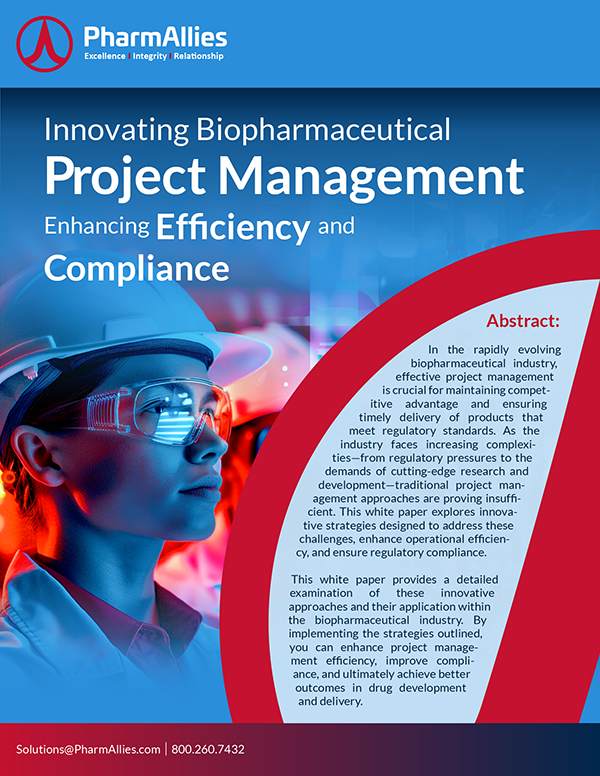The Critical Role of Project Management in Biopharmaceuticals
Introduction
In the fast-paced world of biopharmaceuticals, transforming innovative ideas into life-saving treatments is a complex journey fraught with challenges. Every phase, from research and clinical trials to navigating stringent regulatory requirements, demands not only scientific excellence but also precise coordination and rigorous planning. The stakes are incredibly high, both in terms of financial investment and the potential impact on patient lives. This is where project management becomes essential, serving as the backbone that ensures these critical projects are executed efficiently, compliantly, and with the utmost focus on quality.
Throughout my career in the biopharmaceutical industry, I’ve seen firsthand how effective project management can be the difference between success and failure. It’s not just about keeping tasks on schedule or within budget—it’s about fostering an environment where innovation can thrive while ensuring every step meets the highest regulatory standards. In one memorable Serialization and Aggregation project, we faced significant delays until we implemented a robust project management strategy. The shift was remarkable: timelines shortened, communication improved, and we moved closer to our goals with newfound clarity.
Project management in the life sciences field is unique. It involves managing the intricate balance between scientific discovery, regulatory compliance, and market readiness. I’ve experienced projects where a lack of cohesive project management led to costly delays, and others where strong management practices enabled us to bring products to market ahead of schedule, benefiting both the company and patients in need.
In today’s competitive and highly regulated environment, the role of project management is more critical than ever. It ensures that biopharmaceutical companies can navigate complexities, meet regulatory demands, and deliver products on time. Beyond individual projects, effective project management drives strategic value, fostering continuous improvement and positioning companies for long-term success.
This article explores the pivotal role of project management in the biopharmaceutical industry, drawing on my experiences to highlight why it is essential for regulatory compliance, timely delivery, and overall success. Whether you’re an industry veteran or new to the field, understanding the impact of project management is key to overcoming challenges and seizing opportunities in biopharmaceutical development.
Let’s explore how project management can turn innovative ideas into impactful treatments, ensuring that your next project reaches its full potential.
The Complexity of Biopharmaceutical Development
Biopharmaceutical development is a multi-faceted journey. Each phase—from initial research to commercialization—requires careful planning and coordination to avoid delays and setbacks.
Research and Development (R&D)
- Balancing Innovation with Practicality: The R&D phase is where innovation meets reality. I’ve been in situations where groundbreaking ideas needed to be balanced with practical timelines and resources. Effective project management ensures that creative efforts are directed towards achievable goals, preventing the project from veering off course.
- Coordinating Cross-Functional Teams: Working with diverse teams—scientists, regulatory experts, clinicians—can be challenging. I’ve learned that project management is key to aligning these teams, ensuring that their efforts are coordinated and focused on moving the project forward.
Clinical Trials
- Prioritizing Patient Safety and Data Integrity: Clinical trials are critical. In one project, the importance of data integrity and patient safety became clear when a minor oversight could have jeopardized the entire trial. Strong project management is essential in maintaining strict protocols and ensuring that every step is conducted with the utmost care.
- Navigating Regulatory Compliance: Regulatory oversight in clinical trials is intense. I’ve seen how meticulous documentation and adherence to guidelines can make the difference between a smooth approval process and costly delays. Project management helps ensure that all regulatory requirements are met without compromise.
Regulatory Approval
- Handling Complex Requirements with Confidence: The regulatory approval process is often complex, with different regions having unique requirements. I’ve learned that a systematic approach to project management can simplify this process, ensuring that submissions meet all necessary criteria and withstand regulatory scrutiny.
- Streamlining Communication: Clear communication with regulatory agencies is crucial. Effective project management ensures that all interactions are handled promptly and that any issues are resolved quickly, keeping the project on track.
Manufacturing and Commercialization
- Scaling Up Without Sacrificing Quality: Transitioning from approval to manufacturing involves scaling up production while maintaining quality. I’ve been part of teams where project management was critical in ensuring that production scaled smoothly, with quality control measures in place to prevent issues.
- Executing a Successful Market Launch: Bringing a product to market is a complex process that requires careful coordination. Project management ensures that marketing, sales, and distribution teams are aligned, ensuring a smooth and efficient product launch. I’ve seen how well-coordinated launches, supported by strong project management, can make the difference between a successful market entry and a missed opportunity.
The Importance of Regulatory Compliance
Regulatory compliance is a cornerstone of the biopharmaceutical industry. It’s not just about meeting legal obligations; it’s about ensuring that the products you bring to market are safe, effective, and trustworthy.
Mastering Documentation and Reporting
- Keeping Comprehensive Records: I’ve worked on projects where the volume of required documentation seemed overwhelming. However, a well-structured project management approach ensures that every piece of data is meticulously recorded and easily accessible. This organization is crucial for passing audits and regulatory reviews.
- Real-Time Reporting: I’ve found that implementing real-time reporting mechanisms can prevent issues from escalating. By continuously monitoring and reporting data, you can stay ahead of potential problems and ensure that your project remains compliant.
Adapting to Regulatory Changes
- Staying Ahead of the Curve: The regulatory landscape is always evolving. I’ve experienced firsthand how staying informed and adaptable is key to navigating these changes. Effective project management helps you build the flexibility needed to adjust to new regulations without disrupting your project.
- Proactive Compliance: Rather than reacting to changes, I’ve learned the value of anticipating them. By regularly reviewing regulatory trends and preparing for potential shifts, you can maintain compliance and avoid last-minute scrambles.
Managing Cross-Border Compliance
- Navigating Global Requirements: Taking a product to international markets introduces additional layers of complexity. I’ve managed projects where meeting diverse regulatory requirements across regions was a significant challenge. Project management plays a crucial role in streamlining processes to ensure compliance in multiple jurisdictions.
- Creating Streamlined Processes: Developing standardized templates and workflows that can be adapted for different regulatory bodies has been a successful strategy in my experience. This approach saves time and ensures consistency, making global compliance more manageable.
Ensuring Timely Product Delivery
Timely delivery in the biopharmaceutical industry is crucial not only for financial reasons but also for delivering life-saving therapies to patients.
Planning and Tracking Milestones
- Defining Key Milestones: Setting clear milestones is essential for keeping projects on track. I’ve seen projects thrive when milestones are well-defined and closely monitored. This allows for steady progress and ensures that the project stays aligned with its overall goals.
- Tracking Progress: Monitoring progress against these milestones is equally important. Tools like Gantt charts and dashboards have been invaluable in my experience, helping to visualize timelines, budgets, and resources, and allowing for early identification of potential issues.
Managing and Mitigating Risks
- Identifying Potential Risks: Risk management is a critical aspect of project management. I’ve encountered projects where identifying risks early on allowed us to develop strategies to mitigate them, preventing significant delays or issues later.
- Implementing Mitigation Strategies: Having contingency plans and the flexibility to reallocate resources when challenges arise has proven to be an effective approach. This proactive stance helps ensure that the project continues moving forward, even in the face of unexpected obstacles.
Optimizing Resource Management
- Allocating Resources Wisely: Resource management can make or break a project. I’ve been involved in projects where tight budget constraints required creative resource allocation. Effective project management ensures that resources are used efficiently, supporting each phase of the project without overspending.
- Avoiding Bottlenecks: Identifying and addressing potential bottlenecks early on has been a key lesson for me. By proactively managing resources and anticipating challenges, you can prevent delays and keep the project on schedule.
Adding Strategic Value Through Project Management
Effective project management doesn’t just keep your project on track—it adds strategic value to your organization by aligning with business objectives, fostering innovation, and driving continuous improvement.
Aligning with Business Objectives
- Translating Strategy into Action: One of the most rewarding aspects of project management is seeing how it aligns with broader business strategies. Whether expanding into new markets or launching innovative products, effective project management helps translate these strategic objectives into actionable plans, driving the project towards successful outcomes.
- Driving Innovation: I’ve led projects where innovation was a core focus. Project management played a critical role in fostering a culture of continuous improvement, ensuring that innovative ideas were executed effectively and led to tangible results.
Enhancing Stakeholder Communication
- Keeping Everyone Informed: Clear communication with stakeholders is crucial for any project’s success. I’ve seen projects falter due to poor communication, leading to misaligned expectations and delays. By ensuring regular updates and transparent communication, project management builds trust and keeps everyone on the same page.
- Managing Expectations: Managing stakeholder expectations is another area where project management shines. Setting realistic timelines and clearly defining deliverables helps prevent misunderstandings and ensures that stakeholders remain supportive throughout the project.
Fostering Continuous Improvement
- Learning from Experience: Continuous improvement is a cornerstone of effective project management. Conducting post-project reviews to identify what worked well and what could be improved has helped me refine my approach over the years, leading to more efficient and effective project outcomes.
- Implementing Best Practices: Staying current with industry best practices is essential for maintaining a competitive edge. By implementing these practices, whether through new methodologies, advanced tools, or refined processes, you can ensure that your projects are executed with the highest level of efficiency and effectiveness.
Conclusion
Effective project management in the biopharmaceutical industry is more than a necessity—it’s a strategic advantage that can set you apart in a competitive field. By ensuring regulatory compliance, timely delivery, and alignment with business objectives, project management is the engine that drives success.
Reflecting on my own experiences, I’ve seen how strong project management can transform challenges into opportunities. It’s about more than just keeping a project on track; it’s about fostering innovation, enhancing communication, and continuously improving processes to achieve better outcomes.
As the industry continues to evolve, the importance of project management will only grow. By investing in and strengthening your project management capabilities, you can navigate the complexities of this dynamic environment with confidence, achieving your goals and delivering life-changing products to patients around the world.



